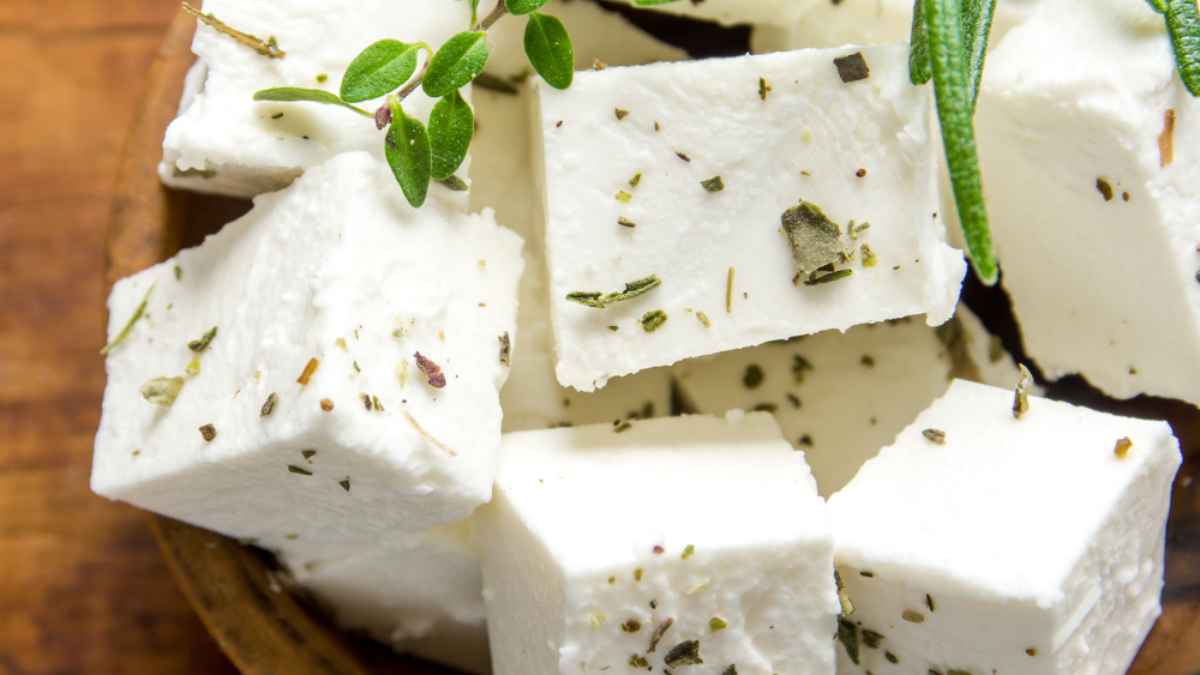Feta is undoubtedly one of the most famous Greek cheeses and has a prominent place on the Greek Mediterranean table.
It is usually consumed as an appetizer, raw or grilled, with olive oil and oregano, or in Greek salads or traditional pies.
In 2002, the European Commission designated feta a protected designation of origin (PDO) product.
Consequently, the name ‘feta’ can no longer be used for cheese of similar composition that – whether made in Greece or abroad – does not meet certain conditions. Some of these conditions are that it be made exclusively from sheep’s milk or a mixture of sheep’s and goat’s milk in specific proportions, coming from specific regions of Greece (Epirus, Thrace, Thessaly, Macedonia, the Peloponnese, Central Greece, Lesvos or Limnos) and from specific breeds of sheep and goats.
| Nutritional Value of Feta Cheese | per serving: 50 g1 | RDI per serving2 |
| Kcal | 132.5 | 6.6% |
| Fat (g) | 10.8 | 13.8% |
| Saturated fat (g) | 6.7 | 33.3% |
| Carbohydrates (g) | 2.0 | 0.7% |
| Fiber (g) | 0.0 | 0.0% |
| Sugar (g) | 2.0 | 2.2% |
| Protein (g) | 7.1 | 14.2% |
| Cholesterol (mg) | 44.5 | 14.8% |
| Salt (g) | 1.4 | 23.3% |
| 1 Values are based on the U.S. Department of Agriculture (USDA) nutrient database.[1] 2 The percentage of Recommended Daily Intake (% RDI) shows how much of the recommended daily intake of each nutrient is contained in a single serving. Calculations are based on U.S. Food and Drug Administration (FDA) daily values, based on 2,000 Kcal per day for an average healthy adult. Depending on an individual’s energy needs, % RDI can be lower or higher. | ||
Feta is a nutrient-rich food.
Specifically, feta is an excellent source of high-quality proteins that contain all the essential amino acids in ideal proportions. Essential amino acids are those that the body cannot synthesise and that therefore must be ingested as part of our diet.
Feta also contains fats, mainly saturated, and small quantities of carbohydrates, mostly in the form of simple sugars like lactose.
Additionally, feta is a good source of vitamins – including vitamin B2 (riboflavin) and vitamin B12 – and minerals such as calcium and phosphorus, which are necessary for, among other things, healthy bones and teeth.
When consumed as part of a healthy and balanced diet, feta can have health benefits.
More specifically, feta can contribute to good bowel health, given that, as a fermented food, it contains probiotics, which are living microorganisms that bolster healthy intestinal microflora.
A number of studies have shown that healthy intestinal microflora are vital to both good bowel health and overall health. In contrast, disruptions in the composition and balance of “good” and “bad” bowel bacteria are associated with the occurrence of chronic conditions such as obesity, diabetes and cardiovascular diseases.[2]
In addition, dairy products such as feta may contribute positively to bone health. Due to their high calcium and phosphorus content, they can contribute to the achievement of maximum bone density during childhood and adolescence, as well as to the prevention of osteoporosis in older people.
However, feta is also high in salt, which should be taken into account, especially by people trying to reduce their sodium intake. High salt consumption can increase blood pressure and the risk for cardiovascular diseases. Therefore, caution is recommended when consuming feta, and it may be prudent to reduce the amount of salt in other foods in a meal that includes feta. Alternatively, feta can be rinsed with water to reduce its salt content.
In conclusion, feta is a favourite cheese of Greek cuisine that contains many nutrients and has health benefits, but it should be consumed in moderation by people who are watching their salt intake.
BIBLIOGRAPHY
[1] USDA.Food search. Cheese feta. Available at: https://fdc.nal.usda.gov/fdc-app.html#/food-details/173420/nutrients. (Accessed October 2024).
[2] Bodke H, Jogdand S. Role of Probiotics in Human Health. Cureus. 2022 9:14(11):e31313. doi: 10.7759/cureus.31313.










